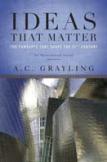A Philosophical Bazaar
A. (Anthony) C. (Clifford) Grayling (b. 1949) likes to have it both ways: He is at once a respected academic—a professor of philosophy at Birbeck College, the University of London and a Supernumerary Fellow at St. Anne’s College, Oxford—and a popular writer. For three years he had a column called “The Last Word” in The Guardian—with no hesitations about poking fun at academe. An expert on what some might think one of the drier regions of philosophy, epistemology, he has also been an activist dealing with such down-to-earth topics as war crimes, human rights and tribal peoples (he was born in Zambia). A vehement atheist, he has nonetheless fought long and hard against skepticism and written some two dozen books ranging far beyond religion to the poetry of Robert Herrick, the life of William Hazlitt and modern China.
Now, in this baggy monster—call it a remake of Voltaire’s Dictionnaire Philosophique (1764)—Grayling scans a vast spectrum of problems and issues with lively, often ultra-opinionated prose in a mostly successful effort to shift them out of the lecture hall and seminar room into Speaker’s Corner and its various equivalents. What subjects fit in here? Or rather, what subjects don’t fit in? Advertising, anti-Semitism, artificial intelligence, Big Bang cosmology, black consciousness, cloning, Daoism, ethnocentrism, game theory, globalization, the Internet, neoconservatism, neuroscience, psychoanalysis, quantum mechanics, Romanticism, slavery, sociobiology, vegetarianism and zeitgeist—you name it, and all in entries averaging a page or two.
Some of them, for example, on standard philosophical themes like the Enlightenment, ethics or existentialism, are mainly informative and non-controversial. Others on, say, Catholicism, Christianity or creationism, are flat-out aggressive. Curiously, the entry on Islam is quite irenic—for Grayling—though he concludes by noting that all the vitriol he has elsewhere expended on Christianity should be applied here as well. There are no entries on individual philosophers; but along the way he inevitably delves into major figures like Plato, Aristotle, Aquinas (on just war theory), Hume, Marx, Sartre and others. In the spirit of Voltaire, practically all the entries are accessible to the lay reader; but a handful of mini-articles on topics like symbolic logic are gratingly technical. (When was the last time you had a cocktail party conversation or after-dinner dialogue about W and Z bosons?)
In many ways, Grayling comes across as a balanced, garden-variety liberal, a supporter of oppressed and marginalized people, a champion of free speech and every sort of autonomy, an egalitarian and a passionate lover of science. On the other hand, he attacks political correctness, arguing that multiculturalism, at least in its naïve embodiments, is finished. He rejects postmodern relativism, ethical or otherwise. And in a bite-the-hand-that-feeds-you mode, he blasts universities, noting in his entry on the history of ethics:
Ever in search of justification for their existence, academics then poach the new debates, and drag them into the dessicating atmosphere of their studies, there to render them impotent and irrelevant again by means of polysyllabic refinements, distinctions, trifling objections, counter-theories, improbable counter-examples, pedantic minutiae, and a drowning flood of neologisms.
Whew, the professor doth protest too much: Grayling often seems to combine knowledgeability and cheerfully intemperate language in about equal measure.
But perhaps public intellectuals can be forgiven for badmouthing pointy-heads; and there are solid reasons why philosophy is widely considered the most obscure and difficult department in the humanities. (Oh, and philosophy majors as a group have the highest G.P.A. in American colleges.) Then too, “non-partisan,” “open-minded” or “self-critical” are not the first adjectives that leap to mind when it comes to philosophers; so perhaps readers will pardon Grayling’s acerbic riffs. Lord knows, beneath solemn academic gowns there sometimes lurks the desire to be a rock star.
At any rate, Grayling makes no bones about his bias. In his entry on positivism, for example, he crows that
It is a scythe to the fancies and fairy tales in which humanity has cocooned itself in its eagerness for explanatory narratives that are easy to understand and comforting, derived from the deepest well of our past ignorances. It is the intellectual attitude of humanity’s emerging maturity, or at least the promise of its emergence one day—we hope—soon.
Oh well, more conservative or less combative readers can always consult The Oxford Dictionary of Philosophy and similar sober manuals. This book is unlikely to become a classic (among other things, how can we know in 2010 which ideas will “shape the 21st century”?) But inquiring minds who ignore Grayling will miss a spirited, even raucous show.
This article also appeared in print, under the headline “A Philosophical Bazaar,” in the May 31, 2010, issue.








